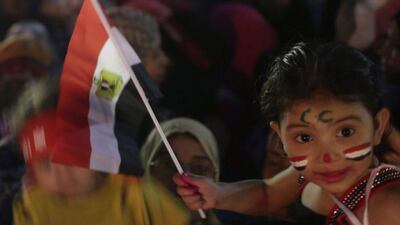CAIRO // Abdel Fattah El Sisi won a landslide victory in Egypt’s presidential race and now faces the task of defeating an Islamist insurgency and ending three years of economic stagnation.
Mr El Sisi won 93 per cent of the votes, compared with 2.9 per cent cast for the leftist politician Hamdeen Sabahi, according to near-final results released yesterday.
Turnout in the vote, which was shunned by former president Mohammed Morsi’s Muslim Brotherhood backers, was about 46 per cent, said the interim president Adly Mansour.
Mr El Sisi’s victory was never in doubt, but the career infantry officer and former military chief had pushed for an overwhelming turnout to bestow legitimacy on his removal July of Mr Morsi, Egypt’s first freely elected president.
Turnout was more than 46 per cent after officials extended voting to a third day. That figure was lower than the 52 per cent turnout in the 2012 presidential election that vaulted Mr Morsi to power.
It also was lower than the bar Mr El Sisi set in his final campaign interview, when he said he wanted three-quarters of the country’s 54 million registered voters to cast ballots so he could “show the world” his support.
Still, Mr El Sisi can genuinely claim he comes into office with an impressive vote tally of 23.38 million votes — significantly more than the 13 million won by Mr Morsi two years ago. Mr Sabahi received 736,000 votes.
It was telling that Mr Sabahi, who came in third in the previous election, garnered even less votes than the 1.03 million spoiled ballots cast.
Mr El Sisi faces the task of reviving an economy growing at its slowest rate in two decades and a nation quick to hit the streets to press for change.
“You wanted it, and we handed it to you,” said Ali Nasser, 34, breaking away from a pack of El Sisi supporters dancing in the street in Cairo’s Nasr City district. “Now, let’s see what you’re going to do.”
In Cairo’s Tahrir Square, the centre of the 2011 uprising that toppled Hosni Mubarak, fireworks lit the sky and drivers honked horns in celebration.
“Regardless of the outcome, Egyptians have proven that they are committed to protecting their hard-won freedoms, including the right to determine who will lead this great nation at this critical time,” said Mr Mansour, who was installed after Mr Morsi’s removal.
The Brotherhood, which fielded Mr Morsi for office and was branded a terrorist group after his removal, called for a boycott of the vote. It has described the turnout level as a “punishment” for Mr Morsi’s removal.
The European Union, which sent observers, said only “minor problems were observed” in the vote. The decision to extend balloting for another day, while “not against the law, caused unnecessary uncertainty”, Mario David, the observer mission’s chief, said.
In a nation where protests can be triggered by the mere talk of cutting food and fuel subsidies, the stakes are high. Adding to the challenges is rising violence by militants and the street crime that mushroomed following Mubarak’s overthrow.
“I just want to feel safe, and Sisi is the one who can make that happen,” Shaimaa Islam, 35, a mother of four, said as she bought groceries after polls closed. “We’re tired of the violence and the problems. We just want to build our lives again.”
Key to Mr El Sisi’s success will be his ability to lure back investment. While rights groups bemoan what they fear may be the re-emergence of a Mubarak-era police state, investors are betting that Mr El Sisi may be able to turn the country around.
The stock market, which fell 2.3 per cent on Wednesday as some players said the turnout was a disappointment, closed down 3.45 per cent on Thursday, after the finance minister approved a 10 per cent tax on stock market profits. On the black market, the Egyptian pound weakened slightly.
Financial backing from Mr El Sisi’s Gulf allies has helped to boost the markets. Saudi Arabia, the UAE and Kuwait have pledged about US$12 billion (Dh44.04bn) in aid.
“Egypt and Saudi Arabia can work together to face threats, either internally like the Muslim Brotherhood, or externally like Iran and its supporters in the area,” said Mohammed Zulfa, a member of Saudi Arabia’s Shura Council, an appointed body that advises the government.
“I think the Saudis will do all they can to support Sisi now he has been elected as he was supported by the Egyptian people.”
Mr El Sisi also faces the formidable task of crushing an Islamist insurgency and eliminating any threat from the Brotherhood, which, as the country’s best-organised political force, had won every national vote held after Mr Mubarak’s fall.
Islamist militants in the Sinai have stepped up attacks since Mr Morsi’s removal, killing hundreds of police and soldiers in violence that has hammered the vital tourism industry.
* Bloomberg with additional reporting by Associated Press and Reuters

